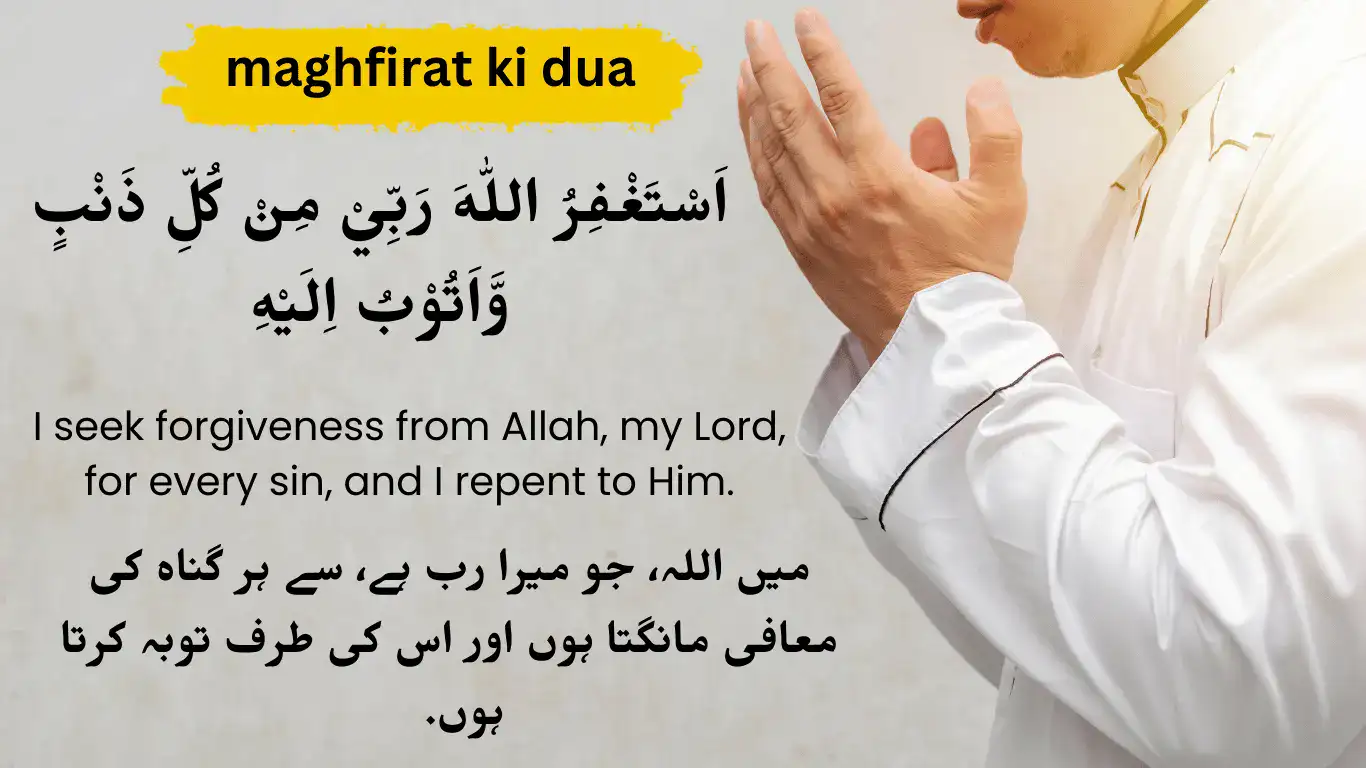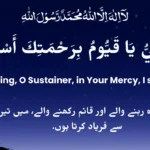In Islam, seeking forgiveness (Maghfirat) is a significant aspect of a believer’s relationship with Allah. The act of repentance is not only a means to cleanse one’s soul but also a way to draw closer to Allah’s mercy. Here, we will discuss some important duas for maghfirat that every Muslim can recite to seek Allah’s forgiveness.
| Bukhar Ki Dua –Relief from Fever | بخار کی دعا |
| Rizq Mein Barkat Ki Dua | دعاء رزق میں برکت |
| Karz Ki Dua (Prayer for Debt Relief) |
| Pet Dard Ki Dua (Dua for Stomach Pain) |
1. Dua for General Forgiveness
Arabic: اَسْتَغْفِرُ اللّٰهَ رَبِّيْ مِنْ كُلِّ ذَنْبٍ وَّاَتُوْبُ اِلَيْهِ
Transliteration: Astaghfirullah Rabbi min kulli dhambin wa atubu ilayh
English Translation: “I seek forgiveness from Allah, my Lord, for every sin, and I repent to Him.”
Urdu Translation: “میں اللہ، جو میرا رب ہے، سے ہر گناہ کی معافی مانگتا ہوں اور اس کی طرف توبہ کرتا ہوں۔”
This dua is a simple yet powerful supplication to seek forgiveness from all sins. The act of constantly saying “Astaghfirullah” purifies the heart and reminds a believer of their dependency on Allah’s mercy. Regular recitation of this dua can lead to a cleansed heart and soul, bringing peace and spiritual clarity.
2. Dua for Acceptance of Repentance
Arabic: رَبِّ اغْفِرْ لِي وَتُبْ عَلَيَّ إِنَّكَ أَنْتَ التَّوَّابُ الرَّحِيمُ
Transliteration: Rabbi ighfir li wa tub alayya innaka anta at-Tawwab ar-Raheem
English Translation: “My Lord, forgive me and accept my repentance. Indeed, You are the Accepting of repentance, the Merciful.”
Urdu Translation: “اے میرے رب! میری مغفرت فرما اور میری توبہ قبول فرما، بے شک تو توبہ قبول کرنے والا اور مہربان ہے۔”
This dua emphasizes the qualities of Allah as “at-Tawwab” (The Acceptor of Repentance) and “ar-Raheem” (The Merciful). It is a beautiful reminder that Allah is always willing to forgive His servants when they turn to Him sincerely. By reciting this dua, a believer seeks not only forgiveness but also the acceptance of their repentance, which strengthens their resolve to avoid sin in the future.
3. Dua for Allah’s Love for Forgiveness
Arabic: اَللّٰهُمَّ اِنَّكَ عَفُوٌّ تُحِبُّ الْعَفْوَ فَاعْفُ عَنِّي
Transliteration: Allahumma innaka Afuwwun tuhibbul afwa fa’fu anni
English Translation: “O Allah, You are Forgiving and love forgiveness, so forgive me.”
Urdu Translation: “اے اللہ! بے شک تو معاف کرنے والا ہے اور معافی کو پسند فرماتا ہے، پس مجھے معاف فرما۔”
This dua is often recited during the last ten nights of Ramadan, especially on Laylatul Qadr. It highlights Allah’s attribute of loving forgiveness, encouraging believers to seek pardon with the hope that Allah, who loves to forgive, will grant them maghfirat. This dua serves as a profound reminder of Allah’s compassion and mercy, reassuring believers of His readiness to forgive if approached with a sincere heart.
Importance of Seeking Maghfirat
Seeking maghfirat is an essential aspect of spiritual growth in Islam. When a believer acknowledges their sins and seeks forgiveness, they show humility and dependence on Allah’s mercy. Allah promises to forgive those who turn to Him with sincere repentance. Each of these duas mentioned above is a pathway to achieving Allah’s mercy and earning a place closer to Him.
Benefits of Reciting Maghfirat Ki Dua
- Purifies the Heart: Reciting these duas regularly helps cleanse the heart from the effects of sins.
- Brings Peace of Mind: Seeking forgiveness leads to inner peace and mental relief as one releases guilt and remorse.
- Increases Taqwa (God-consciousness): Acknowledging one’s sins and seeking forgiveness makes a believer more conscious of Allah’s presence and guidance.
FAQs:
The best times include after every obligatory prayer, during the last third of the night, and especially in the last ten nights of Ramadan.
Yes, while Arabic is preferred, believers may seek forgiveness in any language as Allah understands all languages and intentions.
Seeking maghfirat cleanses the soul, strengthens one’s relationship with Allah, and leads to a more peaceful and contented life.
As we seek forgiveness, let us approach Allah with a sincere heart and a humble spirit. The “Maghfirat Ki Dua” is a beacon of hope, guiding us towards divine mercy. May we embrace the transformative power of repentance and emerge from our shortcomings, purified and renewed.




